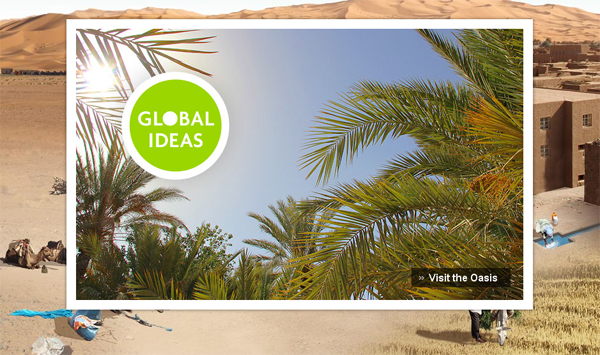Technology is shaping the market
Guest Commentary
Petra Schneider, DW’s Director of Sales and Distribution
 If you wanted to watch your favorite show 20 years ago, it was like catching a train: You had to be on-time. If you were in part of the world with limited entertainment options, maybe a global broadcaster could provide you with a trickle of content. Now fast forward to the Internet age where an endless amount of content covers literally everything imaginable. Things are changing fast and big broadcasters are constantly adapting to make as much available as possible.
If you wanted to watch your favorite show 20 years ago, it was like catching a train: You had to be on-time. If you were in part of the world with limited entertainment options, maybe a global broadcaster could provide you with a trickle of content. Now fast forward to the Internet age where an endless amount of content covers literally everything imaginable. Things are changing fast and big broadcasters are constantly adapting to make as much available as possible.
Technology has once again triumphed over geography. Producing media that can be adapted to succeed in diverse global markets is imperative as distribution and consumption have become less affected by borders. It has never been easier to access content globally and for media providers like DW, competition is growing in a market sector that was once exclusively occupied by international broadcasters.
These are some of the big issues that will be covered at this year’s MIPCOM global entertainment conference. According to MIPcube, broadcasters providing many gateways which guide and facilitate their audience’s access to content are those who will succeed. Audiences are quickly changing from passive consumers to active users who demand flexibility in choosing what and when they watch.
Internet Protocol Television (IPTV) is a medium providing on-demand content that is really set to take off— especially in developing markets. According to a study by Digital TV Research, IPTV is projected to add 98 million new subscribers globally by 2018. 71 percent of these new subscribers will be in the Asia-Pacific market.
DW has established brand recognition in markets like Asia and can play off its traditional strengths with content provided on new mediums. Programming packages that are internationally successful, such as DW Transtel, are already available on-demand but they can also be packaged to fit the growing IPTV market and even be connected with other DW media and networked by users on platforms.
The disruptive effect of social media and content sharing on broadcasters and studios should instead be seen as an opportunity. When thinking about how to best use social media, many large broadcasting companies are still stuck on the idea of a sender-receiver dichotomy. Rather than trying to create a dialogue between “us and them”, broadcasters should be providing platforms where users can network and share news, video and multimedia content. The interactivity of IPTV packages could allow for this user generated distribution and there is no reason why platforms cannot be managed by large broadcasters. The more flexible broadcasters are in distributing content with rapidly changing mediums, the more successful they will be in growing and maintaining an audience.
Market roundup: October 2013
Latin America
DW’s Portuguese science magazine Futurando now being broadcast nationwide in Brazil. The educational broadcaster Canal Futura will begin broadcasting DW’s successful Portuguese language science program Futurando on October 10. Canal Futura belongs to Globo, the largest media group in Brazil, and is the first private broadcaster in the country exclusively dedicated to educational programming. The channel has a technical range capable of reaching a potential audience of 94 million people in Brazil through terrestrial broadcasting in Rio de Janeiro and nationwide coverage on satellite, cable and affiliate stations.
A merger uniting the Colombian broadcaster and DW (Latinoamérica) partner UNE-ESM with the digital services provider Tigo has created formidable new presence on the Colombian media market putting the conglomeration in competition with Claro for first place.
Asia
Starting this month, DW’s English language news magazine Journal will be available nationwide in Afghanistan on Saba TV. The private broadcaster focuses on educational programming aimed at a young audience of information seekers. The channel belongs to the Saba Group, the operators of Radio Nawa which currently broadcasts the daily radio news program from DW in Pashto.
A new contract with the Indian public broadcaster Doordashan will place Manthan, a DW Hindi production, on six more of its regional channels.
The Taiwanese IPTV provider Vee Time is now offering DW’s flagship channel in English around the clock on Vee TV.
Middle East
Al Jazeera’s documentary channel has acquired a total of 99 hours of programming from DW Transtel’s portfolio. New programming aimed at the channel’s male target audience including extreme sports and motor sports will accompany formats covering science, medicine, nature, the environment and economic development. The documentary film channel from Al Jazeera broadcasts primarily in Arabic and can be received worldwide via satellite. Their core target area covers the Arab world.
Eastern Europe
Commentary and interviews from DW’s online service in Russian are now being featured on the popular Russian Internet portal Rambler.ru. The new partner website boasts 21 million visitors every month placing it among the most visited Russian language websites on the Internet. Since the beginning of the partnership with Rambler, DW Russian has recorded a clear increase in the number of online users.
The Ukrainian online news portal, Facenews.ua, which was founded in June, has also integrated content from DW’s Russian and Ukrainian news departments into a DW content box on their website.
Africa
DW content is now being featured on Radio Tumaini and Tumaini Television as well as the group’s online portal. In addition, a Global 3000 content box is now featured on Radio WA’s homepage in Uganda. Radio WA has been broadcasting DW’s English radio program Africa Link since 2012.
Online
DW’s international news and current affairs content is available in four languages on the world’s largest free online television website FilmOn.com. Alki David, the eccentric and controversial billionaire owner of FilmOn.com said they were delighted to able include DW’s “authoritative and highly engaging” content on the pioneering web service which provides television content streamed online and on-demand. The partnership brings DW into the fast growing market of on-demand internet TV and into an exciting new area of distribution. FilmOn has 45,000 hours of total video, all which are updated on a rolling basis.
Spanish, German and PopXport are all getting more air time
Starting September 30, audiences in Asia and Latin America will be able to enjoy an expanded DW television lineup in Spanish and German. DW (Latinoamerica) will be increasing its Spanish language programming from 20 to 24 hours a day and DW (Asien) will also feature a full 24 hours of German language programming. The change is a part of a strategy to provide programming that it suited to the demands of different global markets. The success of DW’s Spanish programming in Latin America has dictated the change to a full 24-hour program. In Asia, DW already offers 24 hours of English language programming on its flagship channel. Increasing DW (Asien) programming to 24 hours in German will make DW the go-to channel for a complete selection of German language television in Asian markets.
But that’s not all, PopXport, DW’s trendy music magazine featuring all the best music and bands from Germany, will now be aired once every week.
Finding a diamond in the sand
DW’s Global Ideas has always been good at going to some of the most exotic places on earth and uncovering stories that have an environmental impact. The latest adventure heads off to a remote region in the Moroccan Sahara that is home to the Hanabou oasis, a small village that is part of the bigger Tafilet oasis which is considered to be one of the largest in the world. Now, Oasis Life – Defying the Desert provides you with a unique look at culture and people that have adapted to life in very harsh conditions. However, climate change is beginning to threaten the water supply and every aspect of their existence hangs in the balance. Magnificent footage and insightful interviews help you to understand the fragile yet beautiful simplicity of life in the desert from the traditional Bedouin nomads who today yearn for the ancient freedom of the desert to the tourism economy dependent on the 200,000 annual visitors to the majestic Erg Chebbi sand dunes. Don’t miss out on this inspiring and educational multimedia journey.
Brent Goff gives his take on the German elections
Guest Commentary
Brent Goff, Host of DW’s Agenda
 If you have something to say, do it now! That is the motto for Germany’s candidates in these final hours of the campaign. Voters go to the polls Sunday. I have covered every national German election since 1998, and I can say that the 2013 campaign will go down in history as the biggest sleeper of my career so far. When campaigning officially began in the summer, polls revealed most Germans were thinking more vacation than choosing a new government. We talked about political apathy a few weeks ago on my show Agenda with Brent Goff. I asked a German campaign advisor who worked on Barack Obama’s winning teams in 2008 and 2012 to explain what could grab voters’ attention.
If you have something to say, do it now! That is the motto for Germany’s candidates in these final hours of the campaign. Voters go to the polls Sunday. I have covered every national German election since 1998, and I can say that the 2013 campaign will go down in history as the biggest sleeper of my career so far. When campaigning officially began in the summer, polls revealed most Germans were thinking more vacation than choosing a new government. We talked about political apathy a few weeks ago on my show Agenda with Brent Goff. I asked a German campaign advisor who worked on Barack Obama’s winning teams in 2008 and 2012 to explain what could grab voters’ attention.
Now, election day is upon us and the latest poll shows 30 percent of voters still haven’t decided what they will do at the ballot box. An amazingly high number considering all that is at stake in this election! So this week we highlighted the major issues on Agenda.
On Sunday, I will be anchoring DW’s special coverage of the German Election 2013 beginning at 15:30 GMT. You can watch our live reporting on live stream.
Here’s my list of what to watch for–and my proof that this election will NOT be a big yawn.
1. The new Alternative für Deutschland AfD Party is THE wild card in this election. The party protests Germany’s euro crisis policy and advocates a German exit from the eurozone. Polls show it may pass the 5 percent threshold to enter parliament. That would be a symbolic slap in the face to German Chancellor Angela Merkel’s marriage to austerity and bailouts.
2. The Free Democrats FDP, the current coalition partner in Germany’s government, has become the party no one likes. Polls suggest it could get less than 5 percent of the vote on Sunday. That would prohibit entry into parliament and disqualify the party from any coalition. That would create a mega headache for German Chancellor Angela Merkel.
3. Without the FDP, the conservative CDU party of Chancellor Angela Merkel may have to join forces with its arch rival, the Social Democrats SPD, to form a grand coalition. The parties have done this before–and it didn’t work too well.
4. Last, but not least, watch the Twittersphere for what voters will say about the main candidates and their wardrobes! During the TV debate between Chancellor Merkel and her opponent Peer Steinbrück, everyone tweeted nonstop about Merkel’s necklace with the colors of the German (or Belgian) flag. Issues matter, you see.
Join me Sunday to watch the results come in. I promise there will be no yawning and plenty of adrenaline. Tweet me your thoughts @BrentGoffTV.
See you Sunday!
Check out DW’s full coverage of the German elections online.










Feedback